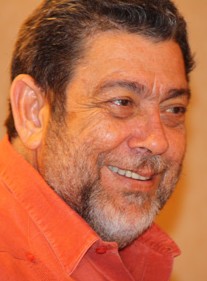
KINGSTOWN, St. Vincent – The 15 per cent increase in property tax announced earlier this month is both fair and reasonable, says Prime Minister Dr. Ralph Gonsalves.
Owners of properties with a market value of more than EC$25,000 will this year begin paying 0.08 per cent of the value of the property to the state, annually.
This will see property owners paying an average of 15 per cent more even as some payment rise by 25 per cent and some existing taxpayers no longer paying.
Gonsalves, in defending the new system, said at a press conference on Wednesday that since coming to office in 2001, his government has reduced income tax rates, at the highest levels, from 40 per cent to 32.5 per cent.
He further said that his Unity Labour Party administration has increased the annual income exemption threshold from the first EC$11,000 to the first EC$20,000.
“So their actual take home pay has increased as a consequence of the deductions for income earners in the country, which has added to the pay packets,” said Gonsalves, who is also Minister of Finance.
He further said that under the previous annual rental value (ARV) system, only 29,000 properties were registered for taxation.
However, the new market value system captures 40,000 properties plus an additional 15,000 structures.
“Why should you be paying taxes and your neighbour, who has built a new house, and who wasn’t on the property tax roll, [not] pay their taxes. Don’t you want everybody to be paying? So that’s the fairness point,” Gonsalves said.
All modern tax systems have moved from ARV to market value, Gonsalves said, adding that using the market value of properties to levy taxes is more objective.
He said that the data analysis that informed the new tax rate found that 5 per cent of the ARV equals 0.07 per cent of the market value and his government set the property tax at 0.08 per cent of market value per annum.
He, however, said that the market value of some properties is so high that 0.08 per cent of it would amount to much more than the original ARV taxation payment.
“Well, it can be unfair to someone, terribly; so you put a cap. That why you say on an average, the increase will be about 15 per cent but you put a cap there for 25 per cent.
“I think that those are reasonable propositions given the historically low rate of property tax in the country and the low level of compliance,” Gonsalves said, adding that the exemptions “add to the reasonableness”.
He further said that donors in Europe, where property taxes are very high, might be wont to think that increasing property tax locally is one way for this country to help itself.
“I raise these as practical matters,” Gonsalves said.
“I mean I have a responsibility to govern, you know. When you give me quote-on-quote power, or authority, it comes with a responsibility to govern. I can’t abandon the responsibility.
“The oldest profession in the world, I have been advised, has a lot of power over men, but they carry no responsibility. You would not wish me to conduct myself akin to the oldest profession in the world. No! So I believe that when people look at it, … it is reasonable,” Gonsalves said.
He said that exempting properties that are valued less than EC$25,000 would cost the state EC$900,000 per year and that his advisors did not support the exemptions.
“But this is a government of the poor and working people and the good Lord blesses he who considers the poor and He protects us who so act against all sorts of adversities and helps us in areas in which you can’t begin to contemplate,” Gonsalves said.





